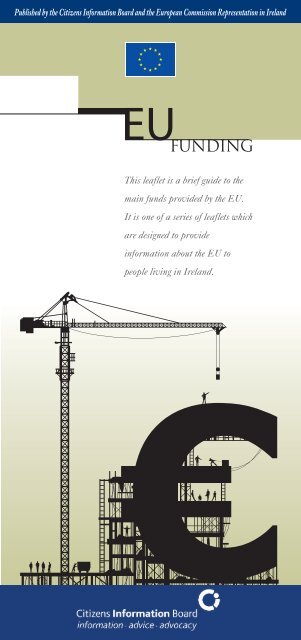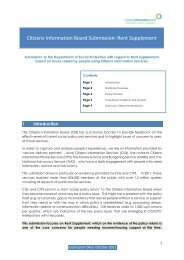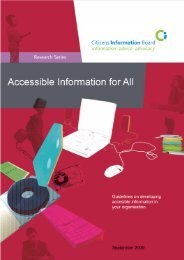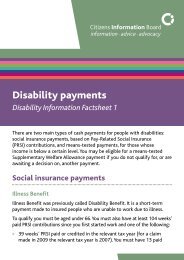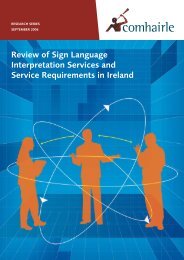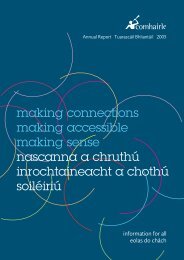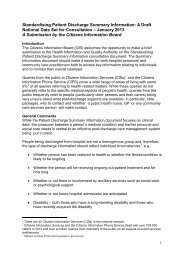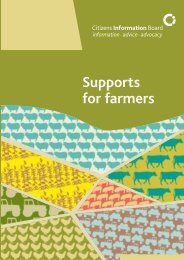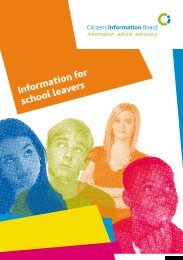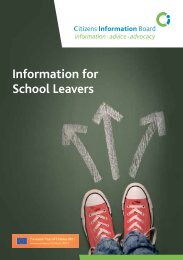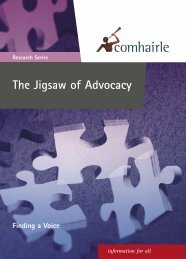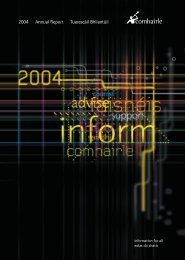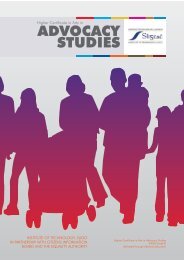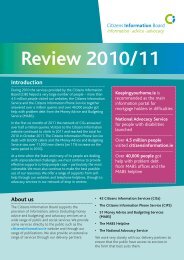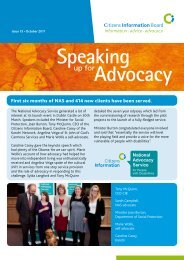leaflet - European Commission - Europa
leaflet - European Commission - Europa
leaflet - European Commission - Europa
Create successful ePaper yourself
Turn your PDF publications into a flip-book with our unique Google optimized e-Paper software.
Published by the Citizens Information Board and the <strong>European</strong> <strong>Commission</strong> Representation in Ireland
INTRODUCTION<br />
The majority of EU funds are managed and disbursed by the<br />
government departments or agencies within the Member States.<br />
These include funds for agriculture and structural funds. The rest of<br />
the funds are managed centrally and directly by the <strong>European</strong><br />
<strong>Commission</strong> - these include funds for education, research, youth<br />
actions and health.<br />
Accessing funds<br />
You may apply to the government department or agency which is<br />
administering the funds. From time to time, the <strong>European</strong><br />
<strong>Commission</strong> issues calls for proposals in relation to those funds<br />
which are centrally managed. These are published in the Official<br />
Journal of the EU and are available on the EU website:<br />
www.europa.eu<br />
These are the main sources of EU funding that are likely to be of<br />
interest to individuals and the community and voluntary sector.<br />
AGRICULTURE AND FISHERIES<br />
Direct payments to farmers<br />
The Single Payment Scheme is the name of the system of<br />
payments to farmers under the Common Agricultural Policy. These<br />
payments aim to support the income of farmers and are not linked
to production. They are, however, subject to conditions in relation to<br />
environmental protection, animal welfare, food safety and keeping the land in<br />
good condition. These payments are administered by the Department of<br />
Agriculture, Fisheries and Food in Ireland. Further information is available from<br />
http://www.agriculture.ie/<br />
Rural Development Programme<br />
Ireland’s Rural Development Programme for the period 2007 - 2013 is<br />
financed partly by the EU and partly by the Irish government.<br />
EU rural development policy focuses on three core areas.<br />
• Improving the competitiveness of agriculture and forestry<br />
• Supporting land management and improving the environment and<br />
• Improving quality of life and encouraging diversification of economic<br />
activities.<br />
http://ec.europa.eu/agriculture/rurdev/index_en.htm<br />
The programme is implemented in Ireland by the Department of Agriculture,<br />
Fisheries and Food.<br />
<strong>European</strong> Fisheries Fund<br />
The <strong>European</strong> Fisheries Fund (EFF) for the period 2007 - 2013 provides<br />
funding for various sectors of the fishing industry including sea and inland<br />
fisheries, aquaculture businesses, producer organisations, and the processing<br />
and marketing sectors.<br />
The fund is operated in Ireland by the Department of Agriculture, Fisheries<br />
and Food.
STRUCTURAL FUNDS<br />
The Structural Funds aim to improve the situation of the less<br />
well off regions of the EU. Ireland has been a major beneficiary<br />
in the past. Ireland will continue to receive some structural<br />
funds over the period 2007 - 2013. The National Strategic<br />
Reference Framework (NSRF) describes how the Irish<br />
government intends to invest this EU funding.<br />
The aims of the NSRF for the two regions (South & East and<br />
Border-Midlands-West) are:<br />
• Promote investment in human capital through upskilling<br />
the workforce, increasing participation in the workforce<br />
and activating groups outside the workforce. The focus<br />
will be on women, people with disabilities, lone parents,<br />
travellers and ex-offenders. A special programme will<br />
target migrants.<br />
• Support innovation, knowledge and entrepreneurship in<br />
the regions. The objective is to boost research and<br />
development (R&D) in areas and institutions (Institutes<br />
of Technology mainly) where this capacity has been<br />
lacking in the past. The aim is to double the number of<br />
PhD graduates during the programming period.<br />
• Strengthen the competitiveness, attractiveness and<br />
connectivity of the National Spatial Strategy through<br />
improved access to infrastructure and promoting<br />
environmental and sustainable development.<br />
There are three operational programmes: one for South and<br />
East (supported by the <strong>European</strong> Regional Development Fund-<br />
ERDF), one for Border-Midlands-West (ERDF) and one for<br />
developing human resources (<strong>European</strong> Social Fund-ESF).
The Irish NSRF is available at: www.finance.gov.ie<br />
The Human Capital Investment OP is available at: www.esf.ie<br />
The Border, Midland and Western Region OP is available at:<br />
www.bmwassembly.ie<br />
The Southern and Eastern Region OP is available at: www.seregassembly.ie<br />
Inter-regional Programmes<br />
The INTERREG programmes aim to address the economic and social<br />
disadvantage in border areas. For the period 2007 - 2013, Ireland is<br />
participating in a number of programmes:<br />
Ireland/Northern Ireland/Western Scotland Programme: the<br />
(INTERREG IV A) Programme is the Cross-Border Territorial Cooperation<br />
Programme for Northern Ireland, the Border Region of Ireland and<br />
Western Scotland.<br />
Ireland/Wales Programme: this programme focuses on maritime<br />
co-operation.<br />
Atlantic Area Programme: this includes Ireland, UK, parts of western<br />
France, northern Spain and Portugal.<br />
North West Europe Programme: this includes Ireland, the UK, northern<br />
France, Benelux countries and part of Germany.
Northern Periphery Programme: this includes the south and<br />
west coast of Ireland, Northern Ireland, part of Scotland, parts<br />
of Sweden and Finland and the non-Member States of<br />
Greenland, Iceland and Faroe Islands.<br />
There is also an interregional programme (INTERREG IV C)<br />
covering all 27 Member States as well as Norway and<br />
Switzerland.<br />
Further Information on all these programmes may be obtained<br />
from: http://ec.europa.eu/regional_policy/index_en.htm<br />
The list of managing authorities for the funds in each region is at:<br />
http://ec.europa.eu/regional_policy/manage/authority/authority_en.cfm<br />
PEACE 111<br />
The PEACE III programme covers the period 2007-13. It aims to<br />
complement the Northern Ireland peace process. It assists projects<br />
in Northern Ireland and in Louth, Monaghan, Cavan, Leitrim, Sligo<br />
and Donegal. The Programme is managed by the Special EU<br />
Programmes Body (SEUPB). www.seupb.org<br />
EDUCATION<br />
The individual Member States of the EU are responsible for their<br />
own education and training systems and they decide on the content<br />
of those systems. The EU may provide funding and support to<br />
supplement the actions taken by Member States. The current EU<br />
programme providing this support is the Lifelong Learning<br />
Programme.http://ec.europa.eu/education/lifelong-learningprogramme/doc78_en.htm<br />
The Lifelong Learning Programme covers the period 2007-2013. It<br />
supports projects and activities that foster interchange, cooperation<br />
and mobility between education and training systems within the<br />
EU. There are four main parts to the programme:
• The Comenius programme deals with the teaching and learning<br />
needs of all those in pre-school and school education up to the end of<br />
upper secondary education, and the institutions and organisations<br />
providing such education;<br />
• The Erasmus programme deals with the teaching and learning needs<br />
of all those in formal higher education, including trans-national student<br />
placements in enterprise, and the institutions and organisations<br />
providing or facilitating such education and training;<br />
• The Leonardo da Vinci programme deals with the teaching and<br />
learning needs of all those in vocational education and training, other<br />
than in third level including placement in enterprise of people other<br />
than students, as well as the institutions and organisations providing or<br />
facilitating such education and training;<br />
• The Grundtvig programme deals with the teaching and learning<br />
needs of those in all forms of adult education, as well as the<br />
institutions and organisations providing or facilitating such education.<br />
There is also a transversal programme which deals with, among other<br />
things, the promotion of language learning and the development of innovative<br />
ICT-based content, services, and practice for lifelong learning.<br />
Co-operation with Other Countries<br />
The EU also has education co-operation programmes with the USA, Canada,<br />
Japan, Australia and New Zealand:<br />
http://ec.europa.eu/education/external-relation-programmes/doc74_en.htm<br />
National agencies<br />
<strong>European</strong> education and training programmes are generally managed on a<br />
joint basis by the national agencies in each of the participating countries and<br />
the <strong>European</strong> <strong>Commission</strong> itself. In Ireland, the national agencies involved are:<br />
Léargas: http://www.leargas.ie/<br />
Higher Education Authority: http://www.hea.ie<br />
FÁS: http://www.fas.ie<br />
Department of Education and Skills: http://www.education.ie<br />
YOUTH IN ACTION PROGRAMME 2007 - 2013<br />
The Youth in Action programme for the period 2007 - 2013 is aimed at<br />
young people aged between 15 and 28 (13-30 for some specific actions).<br />
Particular priority may be given to young people with disabilities and from<br />
disadvantaged groups.
The main aims of the programme are to:<br />
• Promote young people’s active citizenship in general<br />
and their <strong>European</strong> citizenship in particular;<br />
• Develop solidarity and promote tolerance among young<br />
people, in particular in order to foster social cohesion in<br />
the <strong>European</strong> Union;<br />
• Foster mutual understanding between young people in<br />
different countries;<br />
• Contribute to developing the quality of support systems<br />
for youth activities and the capabilities of civil society<br />
organisations in the youth field;<br />
• Promote <strong>European</strong> cooperation in the youth field.<br />
http://eacea.ec.europa.eu/youth/index_en.php<br />
The programme is implemented in Ireland by the Youth Work<br />
Service of Léargas.<br />
CITIZENS FOR EUROPE<br />
The Citizens for Europe 2007 - 2013 aims to help bridge the<br />
perceived gap between the general public and the institutions<br />
of the EU.<br />
It provides grants to groups promoting active <strong>European</strong><br />
citizenship such as local authorities, <strong>European</strong> public policy<br />
research organisations, citizens’ groups, civil society<br />
organisations, NGOs, trade unions and educational institutions.<br />
Grants are provided under the following main headings:<br />
Active citizens for Europe: this involves citizens directly,<br />
either through activities linked to town-twinning or<br />
through other kinds of citizens’ projects;<br />
Active civil society for Europe: this is targeted at Europewide<br />
civil society organizations, that can receive either<br />
structural support on the basis of their work programme<br />
or support for trans-national projects;
Together for Europe: this supports high visibility events, studies and<br />
information tools, Active <strong>European</strong> Remembrance: this action supports<br />
the preservation of the main sites and archives associated with the<br />
deportations and the commemoration of the victims of nazism and<br />
stalinism.<br />
http://ec.europa.eu/citizenship/index_en.html<br />
MEDIA<br />
MEDIA is the EU support programme for the <strong>European</strong> audiovisual industry. It<br />
co-finances training initiatives for audiovisual industry professionals, the<br />
development of production projects (feature<br />
films, television drama, documentaries,<br />
animation and new media), and the<br />
promotion of <strong>European</strong> audiovisual works.<br />
http://ec.europa.eu/culture/media/index_en.htm<br />
CULTURE<br />
The Culture Programme for the period 2007 – 2013 aims to<br />
• Promote the transnational mobility of people working<br />
in the cultural sector;<br />
• Encourage the transnational circulation of works and<br />
cultural and artistic products;<br />
• Encourage intercultural dialogue.<br />
http://ec.europa.eu/culture/index_en.htm<br />
LIFE+<br />
• LIFE+ is the environmental programme for the period 2007 - 2013.<br />
There are three strands:<br />
• LIFE+ Nature and Biodiversity - this focuses on the implementation of<br />
the EU directives on the conservation of habitats and of wild birds as<br />
well as strengthening the knowledge needed for developing, assessing,<br />
monitoring and evaluating EU nature and biodiversity policy and<br />
legislation;<br />
• LIFE+ Environment Policy and Governance covering the other 6EAP<br />
priorities besides nature and biodiversity, as well as strategic<br />
approaches to policy development, implementation and enforcement;<br />
• LIFE+ Information and Communication on environmental issues.<br />
http://ec.europa.eu/environment/life/index.htm
RESEARCH<br />
The 7th Framework Programme (FP7) is the EU’s main<br />
instrument for funding research. It has five programmes:<br />
• Cooperation: support for projects run by transnational<br />
consortia in ten thematic areas ranging from health<br />
• Ideas: support for ‘frontier research’ projects<br />
implemented by research teams or individual<br />
researchers;<br />
• People: researcher mobility and career development;<br />
• Capacities: support for research capacities and<br />
infrastructure;<br />
• Nuclear Research, including fusion energy research<br />
Participation in FP7 is open to a wide range of organisations<br />
and individuals including research groups at universities or<br />
research institutes; companies, individual researchers, and civil<br />
society organisations. There are a number of national contact<br />
points in each Member States - the List of National Contact<br />
Points is at: www.cordis.europa.eu/fp7/get-support_en.html<br />
There is a Research Enquiry Service:<br />
http://ec.europa.eu/research/index.cfm?pg=enquiries<br />
EUROPEAN GLOBALISATION<br />
ADJUSTMENT FUND<br />
This is a fund which may be available to a Member State<br />
which is faced with sudden redundancies caused by changing<br />
global trade patterns. The Member State may ask for funding<br />
to help workers who have been made redundant to reintegrate<br />
into the labour market. The funds may be used to help with<br />
finding another job or retraining.<br />
http://ec.europa.eu/social/main.jsp?catId=326&langId=en
JUSTICE AND HOME AFFAIRS FUNDING<br />
PROGRAMMES<br />
The following are the main funding programmes in the area of justice and<br />
home affairs for the period 2007 - 2013.<br />
Solidarity and Management of Migration Flows<br />
This framework programme has four specific programmes:<br />
• The <strong>European</strong> Refugee Fund<br />
• The External Borders Fund (Ireland and the UK do not participate in this)<br />
• The <strong>European</strong> Fund for the Integration of third-country nationals<br />
• The <strong>European</strong> Return Fund<br />
Fundamental Rights and Citizenship<br />
The Fundamental Rights and Citizenship<br />
programme aims to promote the development<br />
of a <strong>European</strong> society based on respect for<br />
fundamental rights and rights derived from<br />
citizenship of the <strong>European</strong> Union.<br />
Its further objectives are:<br />
• to strengthen civil society and to encourage<br />
an open, transparent and regular dialogue with it<br />
in respect of fundamental rights;<br />
• to fight against racism, xenophobia and anti-Semitism;<br />
• to improve the contacts, exchange of information and networking<br />
between legal, judicial and administrative authorities and the legal<br />
professions; and<br />
• by supporting judicial training, the Fundamental Rights and Citizenship<br />
programme will lead to better mutual understanding among such<br />
authorities and professionals.<br />
Daphne III<br />
The Daphne III programme aims to contribute to the protection of children,<br />
young people and women against all forms of violence and attain a high level<br />
of health protection, well-being and social cohesion.<br />
Its specific objective is to contribute to the prevention of, and the fight against<br />
all forms of violence occurring in the public or the private domain, including<br />
sexual exploitation and trafficking of human beings.<br />
It aims to take preventive measures and provide support and protection for<br />
victims and groups at risk.<br />
http://ec.europa.eu/justice/fundamental-rights/programme/index_en.htm
Security and safeguarding Liberties<br />
This aims to promote co-operation in the fight against crime and terrorism.<br />
There are two specific programmes under this heading:<br />
• Prevention of and fight against crime<br />
• Preparedness and Consequence Management of Terrorism and other<br />
Security related risks<br />
Further information is available at:<br />
http://ec.europa.eu/home-affairs/funding/intro/funding_intro_en.htm<br />
INFORMATION ABOUT EU FUNDING<br />
BENEFICIARIES<br />
The <strong>Commission</strong> publishes information about the beneficiaries of centrally<br />
managed EU funds. This is part of the <strong>European</strong> Transparency Initiative to<br />
improve the openness and accessibility of EU institutions.<br />
The information on centrally managed funds is provided on two websites:<br />
Beneficiaries of Grants:<br />
http://ec.europa.eu/grants/beneficiaries_en.htm<br />
Beneficiaries of Public Contracts:<br />
http://ec.europa.eu/public_contracts/beneficiaries_en.htm<br />
0761 074000<br />
Local Centres<br />
Free & Confidential Service<br />
EUROPEAN COMMISSION REPRESENTATION IN IRELAND<br />
www.euireland.ie


